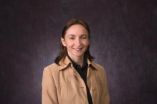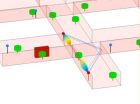(Press-News.org) Tropical Cyclone 02A formed in the Arabian Sea as NASA-NOAA's Suomi NPP satellite passed overhead and captured a visible photo of the storm, spotting strongest storms south of its center.
On June 10 at 08:21 UTC (4:21 a.m. EDT), when Suomi NPP passed over 02A, the Visible Infrared Imaging Radiometer Suite (VIIRS) instrument aboard captured a visible image of the storm. VIIRS collects visible and infrared imagery and global observations of land, atmosphere, cryosphere and oceans.
In the image, Tropical Storm 02A appeared slightly elongated but satellite data shows that it is consolidating and getting better organized. In the visible image, the strongest, tallest thunderstorms (that were casting shadows on the lower thunderstorms) appeared to be south of the center of circulation. The image was created by the Naval Research Laboratory in Washington, D.C.
JTWC indicated that animated enhanced infrared satellite imagery on June 10 showed a slowly-consolidating low-level circulation center with deep convective banding located primarily over the southern semi-circle.
At 1500 UTC (11 a.m. EDT) on June 10, the Joint Typhoon Warning Center or JTWC stated that 02A had maximum sustained winds near 40 knots (46 mph/74 kph). It was located near 16.6 north latitude and 68.0 east longitude, about 508 nautical miles (584 miles/941 km) south of Karachi, Pakistan. 02A has tracked north-northwestward at 8 knots.
JTWC forecasters expect 02A to turn more toward west-northwest over the next couple of days. According to JTWC, 02A is expected to make hurricane status in the next couple of days before weakening on its approach to the Arabian Peninsula.
INFORMATION:
Text credit: Rob Gutro
NASA's Goddard Space Flight Center
NASA-NOAA's Suomi NPP satellite spots Arabian Sea tropical cyclone
2014-06-10
ELSE PRESS RELEASES FROM THIS DATE:
NASA's SDO sees a summer solar flare
2014-06-10
The sun emitted a significant solar flare, peaking at 7:42 a.m. EDT on June 10, 2014. NASA's Solar Dynamics Observatory – which typically observes the entire sun 24 hours a day -- captured images of the flare.
Solar flares are powerful bursts of radiation. Harmful radiation from a flare cannot pass through Earth's atmosphere to physically affect humans on the ground. However, when intense enough, they can disturb the atmosphere in the layer where GPS and communications signals travel.
To see how this event may affect Earth, please visit NOAA's Space Weather Prediction ...
Inside the adult ADHD brain
2014-06-10
CAMBRIDGE, MA -- About 11 percent of school-age children in the United States have been diagnosed with attention deficit hyperactivity disorder (ADHD). While many of these children eventually "outgrow" the disorder, some carry their difficulties into adulthood: About 10 million American adults are currently diagnosed with ADHD.
In the first study to compare patterns of brain activity in adults who recovered from childhood ADHD and those who did not, MIT neuroscientists have discovered key differences in a brain communication network that is active when the brain is at ...
Mammography has led to fewer late-stage breast cancers, U-M study finds
2014-06-10
ANN ARBOR, Mich. — In the last 30 years, since mammography was introduced, late-stage breast cancer incidence has decreased by 37 percent, a new study from the University of Michigan Comprehensive Cancer Center finds.
The analysis takes into account an observed underlying trend of increased breast cancer incidence present since the 1940s, a sort of inflation rate for breast cancer.
Researchers looked at early-stage and late-stage breast cancer diagnoses between 1977-1979, before mammography became popular, and compared it to diagnoses between 2007-2009. Based on trends ...
A plan to share the carbon budget burden
2014-06-10
PROVIDENCE, R.I. [Brown University] — Climate change is an issue of urgent international importance, but for 20 years, the international community has been unable to agree on a coordinated way to reduce greenhouse gas emissions. In a "Perspective" piece published in the June issue of Nature Climate Change, J. Timmons Roberts, the Ittleson Professor of Environmental Studies and Sociology, proposes a four-step compromise toward emissions reduction that offers "effectiveness, feasibility, and fairness."
Their proposal comes as another major United Nations meeting on climage ...
Soldiers who kill in combat less likely to abuse alcohol
2014-06-10
WASHINGTON, D.C. (June 10, 2014)—It's no secret that combat experiences are highly stressful and can contribute to instances of post-traumatic stress disorder and depression among soldiers post-deployment. It also comes as no surprise that many soldiers afflicted with these conditions abuse alcohol in an attempt to self-medicate.
But new research coauthored by Cristel Russell, an associate professor of marketing with American University's Kogod School of Business, and researchers with the Walter Reed Army Institute of Research finds that the most traumatic of all combat ...
New biometric watches use light to non-invasively monitor glucose, dehydration, pulse
2014-06-10
WASHINGTON, June 9—Monitoring a patient's vital signs and other physiological parameters is a standard part of medical care, but, increasingly, health and fitness-minded individuals are looking for ways to easily keep their own tabs on these measurements. Enter the biometric watch.
In a pair of papers published in The Optical Society's (OSA) open-access journal Biomedical Optics Express, groups of researchers from the Netherlands and Israel describe two new wearable devices that use changing patterns of scattered light to monitor biometrics: one tracks glucose concentration ...
A life well spent: Consume now (in case you die early)
2014-06-10
PRINCETON, N.J.—You only live once. Carpe diem. You can't take it with you.
As often as we hear these clichés, they might include some real economic wisdom for some, according to research led by Princeton University's Woodrow Wilson School. The researchers argue in the Journal of Mathematical Economics that some people might want to spend more and work less – just in case their time runs out.
Marc Fleurbaey, the Robert E. Kuenne Professor in Economics and Humanistic Studies and professor of public affairs, and his collaborators – Marie-Louise Leroux from the University ...
Innovative millimeter wave communications to be demonstrated at London exhibition
2014-06-10
Wireless data connections that exploit millimetre wave radio spectrum (30GHz to 300GHz) are expected to be used in worldwide 5G networks from 2020. The University of Bristol's Communication Systems and Networks research group has partnered with Bristol start-up Blu Wireless Technology (BWT) to develop this technology and they will demonstrate their innovative work at the Small Cells World Summit in London this week [10-12 June].
Millimetre wave radios use much higher carrier frequencies than those in current systems, such as 4G and Wi-Fi. The University and BWT radios ...
CU Denver study finds serious challenges to 'New Urbanist' communities
2014-06-10
DENVER (June 10, 2014) – As New Urbanist communities expand nationwide, a study from the University of Colorado Denver shows the increasing challenges of balancing complex traffic engineering systems with the ideals of walkable, sustainable neighborhoods.
As a leading public research university located in the urban core, CU Denver researchers have ample opportunity to connect their work to the city of Denver and surrounding communities. This study focused on Denver's Stapleton neighborhood, one of the largest New Urbanist developments in the nation, specifically examining ...
UK science trio called to Washington ocean summit
2014-06-10
Three leading environmental scientists from the UK have been invited to talk about the state of the world's oceans to an audience including US Secretary of State John Kerry at an ocean summit in Washington. They are amongst less than thirty scientists from around the world who will be providing hard–hitting messages about the need for closer cooperation to overcome the challenges facing our oceans.
Their invitation to this important event is a testament to the excellence of UK environmental science, and underlines its vital role in tackling some of the key challenges ...





